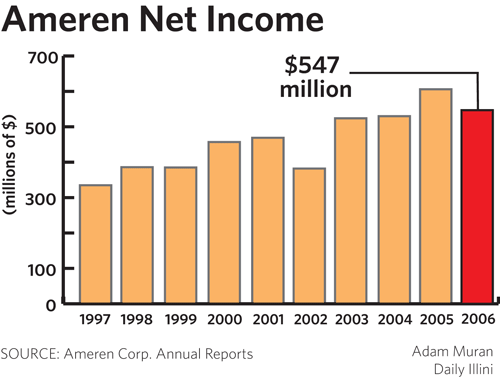Lt. Gov. Quinn discusses re-freezing energy rates

ME Online
Apr 19, 2007
Last updated on May 12, 2016 at 10:25 a.m.
Lt. Gov. Pat Quinn has urged Gov. Rod Blagojevich to convene a special session of the Illinois General Assembly that would address power-provider Ameren’s rate un-freeze that has increased energy bills across the state.
Quinn wants a special session to be held so that the legislature can discuss continuing the former freeze rates, strategies for a comprehensive energy plan in Illinois and a change in law that would make Illinois Commerce Commissioners subject to a voter recall, said Elizabeth Austin, communications director for Quinn’s office. The governor may convene a special session where only issues relating to the pre-ordained subject matter may be addressed.
A decade-long “freeze” on the rate at which Ameren could charge customers for power ended on New Year’s Day of 2007. The increased rate Ameren now charges for power and fees is proportional to the rise in the price of power the utilities company has been paying over the last ten years, said Ameren spokesperson, Natalie Hemmer.
“The rate freeze could drive us to financial insolvency,” Hemmer said. “We could no longer have the wherewithal to purchase power for our customers.”
Get The Daily Illini in your inbox!
Blagojevich told The Associated Press he was “working behind the scenes to roll back rates and freeze them at their old levels.”
According to Ameren’s Web site, customer rates have decreased by six percent since the last freeze while the company’s investments in energy infrastructure has risen 50 percent. Ameren also cites the rise in the cost of coal, shipping resources and their tree-trimming budget as factors for the rate increase.
Austin said under the pre-2007 rate structure Ameren was recording record profits. A press release from Quinn’s office said Ameren issued $213 million of new stock following the rate unfreeze to create financial incentives for “‘those individuals who are and will be responsible for the Company’s future growth,’ according to documents Ameren filed with the Securities and Exchange Commission.” If stock prices were to rise “top execs would be rewarded with millions of dollars worth of stock,” the release said.
“An Illinois worker earning the minimum wage, $6.50 an hour, would have to work six full days to pay that extra $312 the projected rate increase would cost the average household in this area next year,” Quinn said in a press release. “Clearly, these millionaire executives have lost touch with the financial realities facing average families in the Land of Lincoln.”
Currently legislation has been introduced in both the state House and the Senate to address the rate increase. The House has twice passed legislation to return to the former rates and extend the now-defunct freeze. The Senate, however, refused to take up either attempt.
Sen. Gary Forby, D-Benton, filed a bill earlier this year that would roll back the new rates and give Ameren customers a one-year freeze. However, Forby did not call for a vote on the bill before the General Assembly recessed for a two-week break that ended April 17.
“If the government has to step in, there is no guarantee power will be at the 2006 rates,” Hemmer said. “We have to do what’s best to get the power to our customers and keep the lights on.”





